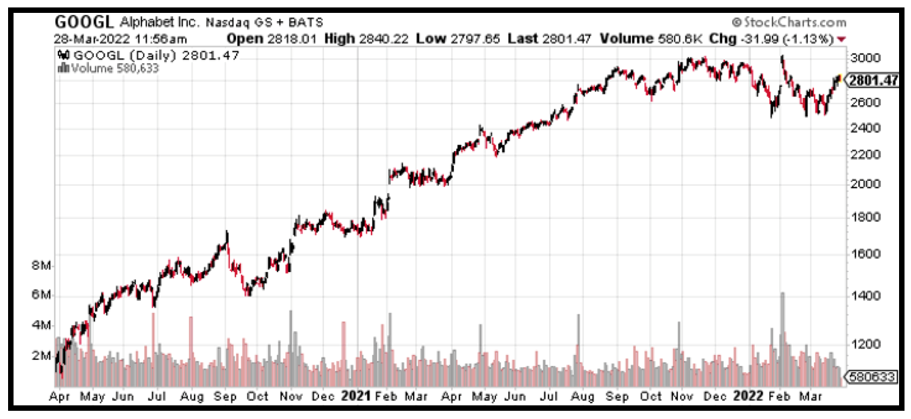Why Alphabet Will Benefit From New European Privacy Rules
European regulators are once again coming after big American technology companies. Some say it's the beginning of the end for them.
Not so fast.
The EU passed the Digital Markets Act (DMA) on Thursday, a far-reaching set of laws designed to level the playing field between small and large tech businesses.
It will not do that. And investors should consider using any near-term weakness to buy Alphabet (GOOGL).
It feels like we've seen this movie before.
The EU took dead aim at Alphabet and Meta Platforms (FB) in 2016 when legislators passed the General Data Protection Regulation (GDPR). The purpose of the GDPR, which went into effect in 2018, was to protect the online privacy of the EU's 447 million citizens.
Related post: China Lockdowns Hurt Big Tech
The law made collection of personal data like name, phone number, username and location far more difficult. Companies were forced to disclose up front what information was being compiled and how it was being used.
Similar legislation was quickly adopted in Japan, South Korea, South Africa, Brazil and the U.K. California even adopted the fundamental facets of GPDR with its consumer privacy act.
Unfortunately for regulators, Alphabet, Meta, Amazon.com (AMZN), Apple (AAPL) and other large American tech franchises are stronger today than ever before. The new DMA doubles down on GDPR, ultimately to the further detriment of competitors.
The DMA is supposed to hamper platforms with market values exceeding $75 billion, according to a report from The New York Times. These so-called gatekeeper businesses will no longer be permitted hold monopolies over app stores.
Messaging services must be interoperable with smaller rivals. Targeted ads that use data gathered across an ecosystem shall be banned unless the user consents. And the use of digital information from third parties will be off limits for the purposes of marketing, an issue that is the subject of an ongoing EU objection with Amazon.com.
These new limitations might've stung a decade ago, but that ship has sailed.
Large American tech firms didn't cheat to win the digital landscape. They won it with better products and services. They earned the trust of European customers.
The DMA — and the GPDR before it — ask consumers to trust smaller companies with their personal data in a world riddled with identity theft and other cybersecurity issues.
This will be a nonstarter for most. Consumers are likely to pick large platforms they trust … then go all in, to the detriment of fledgling competitors.
Then there are the other advantages. Big American firms are winning the innovation race.
Related post: Google Doubles Down on Security
Alphabet and Meta don't need tracking technology to serve ads. They're using machine learning and other artificial intelligence (AI) to build trustworthy ad profiles. Amazon.com is admired throughout Europe for its low prices and wide selection.
The DMA will increase prices. And the market for third-party iPhone app stores is likely smaller and more bothersome than regulators believe. New regulations, although well-intentioned, only shine a bright light on the strengths of the largest tech platforms.
Investors know this.
Since the GPDR was implemented May 25, 2018, the market capitalizations of Apple, Alphabet, Amazon.com and Meta have risen grown 285%, 161%, 106% and 19%, respectively.
Alphabet is especially intriguing. The parent company of Google is home to some of the most beloved digital brands including Google Search, YouTube, Google Maps, Gmail and Chrome.
In most categories, these applications are the undeniable market share leaders. Google Search takes a whopping 86.6% of the global market.
Executives have put Alphabet in a unique position as the dominant player in a digital ad marketplace that now accounts for 64.4% of the $763.2 billion global ad spending pie, according to December 2021 report from The Wall Street Journal.
Sales at Alphabet during 2021 grew 41% year over year, to a record $257.6 billion. Earnings surged 89% to $76 billion, another milestone.
At a price of $2,833, shares trade only 20.8 times forward earnings and 7.2 times sales. Given that gross operating margins were 56.9% in 2021, these financial metrics remain inexpensive.
Alphabet shares could easily trade to $3,625 with 18 months, a gain of 28% from current levels. Investors should use any fallout from the new EU regulations to buy shares.
And speaking of fallout, founder Dr. Martin Weiss and Senior Analyst Sean Brodrick sat down last week for an emergency discussion about supercycles and the need for investors to protect their wealth. They also discuss economic forecasts for the next few years and beyond.
I highly suggest you click here now to learn more.
Best wishes,
Jon D. Markman


